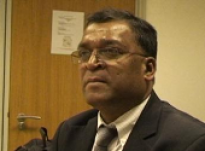Dan - Interview 01

Dan was diagnosed with breast cancer in 2006. He had a mastectomy, chemotherapy, radiotherapy, Herceptin and tamoxifen. He did not want chemotherapy but was told he had to have chemotherapy to be eligible for Herceptin.
Dan is a lecturer, he is married and has one teenage child. Ethnic background' Hindu.
More about me...
Dan noticed a swelling in his breast that was getting worse. He thought this was a result of the workouts he had been doing at the gym. Despite changing his workout the swelling continued to worsen. Eventually after persuasion from his wife and other family members he decided he would see his GP.
Dan suspected something might be wrong when he was waiting in the hospital. The doctor was surprised that he was smiling when he got the news but he felt he had to 'face it'.
Dan suspected something might be wrong when he was waiting in the hospital. The doctor was surprised that he was smiling when he got the news but he felt he had to 'face it'.
When we went to the hospital, where I was sitting, there are all patients, breast cancer patients – then I was thinking, “I think I’ve got something wrong here,” yes.
Dan describes his side effects, which included tiredness, loss of taste, leg pain, loss of appetite, sleeplessness and loss of his head and body hair.
Dan describes his side effects, which included tiredness, loss of taste, leg pain, loss of appetite, sleeplessness and loss of his head and body hair.
What was the experience of having chemotherapy like?
Dan can 'live with' the side effects of tamoxifen to get the benefit.
Dan can 'live with' the side effects of tamoxifen to get the benefit.
And how do you find the tamoxifen?
Dan had been referred to as 'Mrs' rather than 'Mr' when he was being called by staff who didn't know him in the hospital.
Dan had been referred to as 'Mrs' rather than 'Mr' when he was being called by staff who didn't know him in the hospital.
I’ve got one other problem at hospital. They keep calling me Mrs – when they call Mrs [surname] I say, “Not Mrs, Mr [surname],” you see? Everybody, they think that it will be a she. I said, “No, it’s a he.”
Dan didn't want to read all the information he was given about breast cancer. He asked his wife to read it for him.
Dan didn't want to read all the information he was given about breast cancer. He asked his wife to read it for him.
With the consultant, but when the consultant was, he went to see other people, then we were with, nearly one hour with the breast cancer nurse. She briefed us on what’s going on and what will happen and how it will work from now – how the treatment will go.
Dan would have liked to have gone to a support group but the opportunity to go to one was not offered to him as a man.
Dan would have liked to have gone to a support group but the opportunity to go to one was not offered to him as a man.
Would you ever go to a support group with women?

